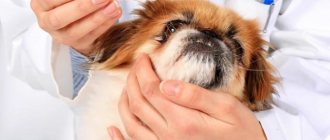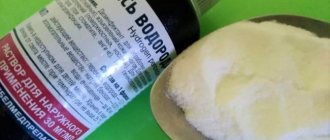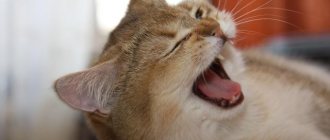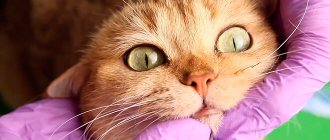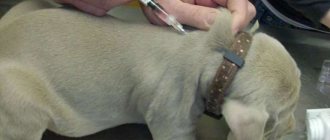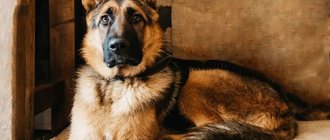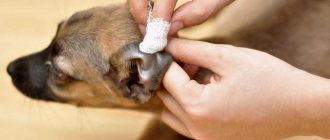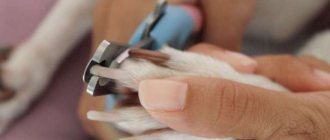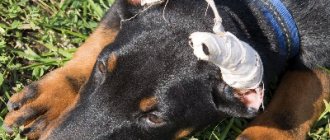Causes of runny nose in dogs
First of all, you need to understand the reasons that caused the disease. Treatment methods depend on them. It is worth noting that there are certain breeds of dogs that are most often susceptible to runny nose and diseases of the respiratory system. These include pugs and sharpeis. This is due to the flattened nose, a structural feature of the muzzle. The nasal passages are short, as a result of which some of the viruses, which should settle inside the mucous membrane, enter the respiratory tract and nasopharynx. This is where inflammation occurs.
Causes of runny nose in dogs:
- Common cold . Most often, with this illness, the pet has a liquid discharge with a small amount of mucus. Reminds me of diluted egg white. In this case, the dog may sneeze, shake its head, or scratch its nose with its paw due to severe itching. However, in general, the pet’s condition is cheerful, he eats well, plays with pleasure, and moves actively.
- Infectious diseases . Usually occurs as a complication after a cold, due to the weakened immunity of the animal. It occurs in older animals whose body resistance is much lower than in young dogs. In this case, the discharge becomes thicker. The dog becomes lethargic, refuses to eat, and may ignore toys that it really likes. This condition requires diagnosis and examination by a doctor.
- Acute illness. In this case, the animal’s nose cannot breathe, since a dense purulent crust has formed inside. There may be a thick, purulent discharge that is yellow or green in color. This condition is very dangerous for the animal, so you should definitely contact a veterinarian.
- Another reason for a runny nose in dogs is an allergic reaction . It can be suspected if there was a change in food, or the dog was running in tall grass.
Why does my dog have a runny nose?
For most people, a runny nose is treated fairly quickly and without complications. In rare cases, a secondary bacterial infection may occur, causing sinusitis and sinusitis. In dogs, the situation with a runny nose is much more serious, since it is not a common cold or hypothermia, unless we are talking about breeds that are prone to various ailments of the nasal cavity. In most cases, nasal discharge is a symptom of serious illness.
Why does a dog have a runny nose?
- Canine distemper or other infectious diseases that affect animals
- Fungal diseases
- Neoplasms in the nasal cavity
- Polyps and cysts
- Mechanical damage received after a walk
- Traumatization of the nose by grass, spikelets
- Wounds after a fight
- Carious dental disease
Caries in dogs must be treated, because the destruction of the roots leads to inflammation of the jaw and can spread to the maxillary sinuses, causing profuse purulent, bacterial discharge from the nose. The ears may be involved in this process. Very often, a runny nose in dogs can occur due to adenovirus. This is an infectious disease that is often called kennel cough, as it mainly occurs in closed groups of animals that come from different regions. If your dog recently attended a dog show, you should be concerned. In most cases, the disease is easier to cure at the initial stage.
Wet nose
Application of drops: result
If the infection contributes to the development of rhinitis, special drops are prescribed. Before using them, the pet’s nasal sinuses are washed with saline so that the active substance penetrates the site of inflammation faster and easier.
Such drugs as Anandin, Maxidin, Pinosol work well. They are instilled into the dog’s nose according to the doctor’s instructions and instructions, which specify the frequency and duration of treatment, as well as the safe dosage.
If the disease has become chronic, use Thymogen drops. They are combined with other drugs in situations where an animal’s runny nose goes away with elevated body temperature and other complications.
How to treat a runny nose in small breed dogs?
The most common form of adenovirosis is tracheobronchitis. The dog immediately develops a dry chest cough, which goes away within a week. The owner’s main task is to prevent the infection from spreading lower, to the lung area, and to prevent pneumonia from developing.
How to treat a runny nose in small breed dogs:
- At the initial stage, to relieve cough, animals are given Mucaltin, Bronholitin to thin the sputum. 3 days after the onset of cough, Lazolvan or Ambrobene to stimulate coughing up sputum.
- The simplest option that will help get rid of mucous secretions and reduce the number of viral and bacterial particles in the nasal passages is Aquamaris drops. They are an isotonic solution of sea salt. Nosol, Humer , which is equipped with a special nozzle for washing, is suitable The main difficulty in dogs is that they have shorter nasal passages than in humans, so rinsing the nose must be done very carefully so that the animal does not choke.
- A runny nose can be caused by a significant number of pathogens, including staphylococci, streptococci, and the herpes virus. Depending on the pathogen, treatment will vary significantly. Therefore, you cannot do without the help of a doctor, since giving antibiotics against viral diseases is not only ineffective, but also dangerous.
- This may lead to resistance to antibiotic therapy. The next time a disease that needs to be treated with antibiotics will be drug resistant.
Forms of rhinitis
According to the specifics of its course, rhinitis is divided into two types:
Acute rhinitis is triggered by widespread irritation of the mucous membranes: temperature changes, mild colds, irritation from smoke, dust or mechanical particles. It occurs in a mild form, usually does not reach the second stage, treatment lasts from 7 to 14 days.
Chronic rhinitis is a consequence of allergies or other abnormalities. It responds well to treatment, but occurs again after a short period of time. For complete relief, it is necessary to identify the disease, the symptom of which is rhinitis, and then determine how to treat the animal.
Cold drops for dogs
During the off-season, in rainy weather, when there are puddles on the street, small dogs very often suffer from a runny nose. You need to take care of them, try not to walk for a long time on a rainy day so that the fur does not get wet. Oddly enough, hunting and watchdogs rarely get sick even during severe frosts and rainy autumn days. This is due precisely to the stability of the breed and genetic endurance. After all, such breeds were created in order to protect, protect and help a person. Decorative dogs are created to delight owners, playing the role of a living toy.
Cold drops for dogs, review:
- Argumistin. This is a combination drug that contains an antibiotic. It is used not only to treat a runny nose, but also to treat the ears and eyes. It is prescribed not only for bacterial lesions of the nasal passages, but also for viral infections, as well as diseases of mixed etiology. The drug contains colloidal silver, as well as Miramistin.
- Anandin. These are drops that improve immunity in the nasal passages. Therefore, it is effective against both viral and bacterial infections. Helps animals even if a runny nose occurs after hypothermia. This drug relieves symptoms and also stimulates the body to fight infection.
- Desacid Forte . This is a drug that contains several components at once. In the composition you can find an antibiotic, succinic acid. Chloramphenicol disrupts protein synthesis in microbial cells, thereby preventing their growth and reproduction. Succinic acid is a stimulating component that eliminates inflammation, improves metabolism between cells, thereby accelerating the effect of drugs.
The pet is sick
Prevention of colds and viral diseases
Strengthening the immune system and improving living conditions will help prevent the development of diseases. To do this, you will need to get all the necessary vaccinations, review the existing diet and walking process.
Vaccination
Annual vaccination protects pets from the most common infections. The production of antibodies after vaccination reduces the likelihood of infection by up to 10%. But even in this case, sick pets experience a mild course and do not suffer from possible complications.
Nutritious food
Health largely depends on nutrition. A lack of vitamins and minerals weakens the body's defenses, so it is very important not to skimp on your pet's diet.
When choosing food, take into account the individual characteristics of the animal: age, gender, breed and physiological condition. It is better to discuss the diet for allergies and gastrointestinal problems with a veterinarian.
How to treat a runny nose in a dog at home?
Antibiotics should not be used for treatment. If it is a cold, then the pet only needs a warm drink and constant rest. Therefore, during the period of illness, choose a cozy place for your pet where no one will disturb him. Be sure to prepare a warm drink; do not restrict food.
How to treat a runny nose in a dog at home:
- To remove nasal discharge, you should use Maxidin. These are drops based on interferon, which increase immunity, improving the body's resistance, preventing the spread of infection. With adenovirus, 3 days after the appearance of snot, the dog begins to cough.
- Reparin Helper is used not only to treat a runny nose, but also for application to the mucous membranes. It is mainly used not for viral and bacterial ailments, but for damage to the nasal passages. Available in spray form. There are no antibiotics or antihistamines in the composition. It contains cytokines - these are molecules that help tissue regeneration in the nasal passages, and also support immune cells, stimulating their work.
- If your dog sniffles a lot at night or during sleep, and after resting green or yellow crusts form around the nasal passages, the pet is lethargic and refuses to eat, you should consult a veterinarian. The fact is that prolonged refusal of food and water can cause exhaustion and death of the pet.
You should not use human drugs for treatment, as they differ in concentration. Some of them are prohibited in veterinary medicine due to a significant number of side effects.
Nasal rinsing
Caring for a sick animal
Proper care will help speed up recovery. During treatment you will have to change your diet, reduce physical activity and insulate your pet’s sleeping place.
Diet and drink
A weakened body needs light but nutritious food. The therapeutic diet involves frequent feeding in small portions. During the first days, the animal is fed low-fat broths, slimy porridges and lean boiled meat. If the food is industrial, dry food is replaced or diluted with wet pates.
To relieve fever and facilitate mucus discharge, it is necessary to ensure compliance with the drinking regime. Change the water twice a day and, if possible, try to warm it to room temperature. In addition to regular water, you can replenish fluid reserves with rosehip decoction, which has an anti-inflammatory effect.
Walks
There is no need to give up walks, but it is better to reduce their duration. In cold, rainy and windy weather, go out solely to relieve yourself, not forgetting about warm overalls. Running, active games and exercises should be prohibited until recovery.
Arrangement of a warm place in the house
The pet's bed should be placed in the warmest and driest place, away from drafts. If the dog lives in a booth or enclosure, do not leave it in the cold and take it into your home.
How can you rinse your dog's nose?
For prevention, nasal rinsing is not carried out in dogs. For preventive purposes, the procedure may be necessary only if the dog likes to “vacuum” objects with its nose, often inhaling dust. Foreign objects can damage the mucous membrane. In addition, there are breeds, for example, the double-nosed hound, which hunt in special conditions. Usually her daily activities involve wallowing in swamps and chasing birds. As a result, fluff and feathers often get into the nasal passages. Therefore, sometimes such a dog needs to rinse the nasal passages.
How to rinse your dog's nose:
- In most cases, rinsing is only necessary if the dog has mucous discharge from the nose, which is associated with allergies, foreign bodies, or infection. Rinsing must be done using ordinary boiled water. For these purposes, you can use saline solution, a one percent solution of chlorhexidine or furatsilin. However, experts recommend using furatsilin in case of bacterial infections, when snot is caused precisely by the proliferation of pathogenic microorganisms.
- The antibacterial properties of furatsilin help prevent the development of bacterial flora. To prepare a solution of furatsilin, you need to crush two tablets into powder, pour them into a small container and pour 250 ml of warm boiled water. The mixture is thoroughly mixed and left for 1 hour. During this time, the crystals should completely dissolve, and the water should turn bright yellow.
- Dioxidin or Interferon after rinsing the nose with ordinary boiled water . Dioxidin is a remedy that helps remove inflammation on the surface of the mucous membrane and prevent the growth of bacterial and viral flora. Furacilin solution or regular saline solution is considered universal. Experts do not recommend preparing a saline solution yourself, but advise purchasing ready-made liquid at a pharmacy of a certain concentration. This will prevent foreign impurities from entering the solution and will minimize the possibility of complications.
The main task is not to injure the dog, but to handle it calmly. Experts recommend training in this procedure from a young age in order to discipline the animal and prevent the emergence of resistance. If the dog is trained, it is easier to rinse the nasal passages.
Neoplasms (tumors)
Rhinitis in this case passes as a symptom and is not often diagnosed in older animals due to the development of tumors of various origins. Diagnosis is made using X-rays, rhinoscopy with collection of biomaterial, ultrasound of the abdominal cavity, and radiographs of the chest cavity to exclude metastasis.
The disease can occur with inflammation of the tooth root and the development of an oronasal fistula. Characterized by unilateral discharge from the nose.
Treatment against the background of neoplasms consists of eliminating the primary factor or continuous symptomatic therapy.
How to rinse a dog's nose with a runny nose?
- For washing, you will need cotton napkins made of soft fabric; disposable viscose handkerchiefs are also suitable. Try to give preference to lint-free wipes, because a dog’s nose is structured differently from a person’s, and dust and hair can settle inside the mucous membrane, causing copious mucus secretion from the nose.
- The main task is to wet the napkins in warm water, carefully removing all the crusts and mucus that flows from the nose. There is no need to rub anything. You need to wait a little and ensure that the crusts become soft and easily move away from the surface of the nose.
- It is necessary to draw a small amount of rinsing solution into the syringe. For small breeds this amount is 1 ml, and for large breeds up to 5 ml. Only after the surface has been completely cleaned should rinsing be carried out.
How to rinse a dog's nose with a runny nose:
- It is necessary for someone in the household to secure the dog and keep its head still. The dog's nose rises slightly, and the prepared solution is infused. It is immediately necessary to rinse not two nostrils at the same time, but one. After this manipulation, you need to give the dog time to cough and calm down. She may start sneezing and coughing, which is completely normal.
- Only after the solution comes out of the nose, it is necessary to repeat the procedure with the second nostril. Under no circumstances should a concentrated saline solution be used to rinse a dog’s nose, as it can cause a burn to the mucous membrane, impairing the pet’s sense of smell.
- It is not recommended to use essential oils, since pets have a keener sense of smell than humans, so essential oils can cause a burn.
Snot
Read on the topic:
- Dogs that won't listen to another owner: 5 breeds
- How to transport a dog on a train?
- 12 foods that can harm your dog
- Why does a dog lick its owner and people it knows?
- How to stop a dog or puppy from jumping on its owner or on people it knows?
You may be allergic to pollen or new food. However, an examination by a doctor is required in order to determine with one hundred percent certainty the cause of the runny nose and prescribe the correct medications.
Maxidin
Another immunomodulatory drug. Available in glass bottles of 5 ml. It is sold in boxes of 5 ampoules, but many pharmacies sell it individually.
Maxidin is included in the complex treatment of viral rhinitis and chronic diseases of the upper respiratory tract.
Maxidin is similar to Anandin intranasal drops. The active ingredient - germanium bis(pyridine-2,6-dicarboxylate) - enhances the production of interferons, which inhibit the spread of infectious pathogens, increase the activity of immune cells, and stimulate the formation of antibodies.
Application
Maxidin is instilled 3 times a day, 2 drops until recovery, but not longer than 2 weeks. The drug can be used to treat pregnant dogs and puppies older than 2 months, but under the supervision of the treating veterinarian.
